Consumer Interest in Brain-Boosting Products on the Rise
The number of US supplement launches with brain/mood health positioning grew at a CAGR of 23% from 2018 to 2022, while those with mental acuity claims grew at a CAGR of 70%.1 Some factors driving this high growth are consumers’ increasing interest in mental wellness, plus a growing awareness of the importance of cognitive performance in sports and fitness.
The trend in biohacking (i.e., using a scientific approach to optimize one’s health and wellness) is also gaining traction. Nootropics are well-positioned to address all of these interests (with #biohacking already a popular tag for nootropics on social media). However, there are still many consumers and brands that don’t know about them.
What are Nootropics?
Nootropics, also known as cognitive enhancers, are substances claimed to boost brain performance—enhancing learning, memory, focus, motivation, and even creativity. Nootropics range from natural substances like herbs to pharmaceuticals. While some substances have long been associated with certain cognitive benefits, a great deal of research is underway to determine the role these substances might play in the brain.
Areas of exploration have included the potential to influence the concentrations, release, or uptake of certain neurotransmitters, hormones, or enzymes. These actions might lead to an increase of nutrients or oxygen to the brain, the stimulation of certain nerves, or the mitigation of inflammatory responses in the brain—all possible ways to cause a temporary improvement in the brain’s so-called executive functions.
What Nutrition Brands Should Know About Nootropics
1. Nootropic Ingredients Come from a Variety of Sources
Nootropics include many different types of ingredients that can be used in foods, beverages, and supplements. Some of the best known are caffeine (a natural stimulant in coffee, tea, and cocoa) and L-theanine (an amino acid in tea), as well as vitamin B12 and omega-3 fatty acids. Creatine and choline are two nootropics often associated with sports nutrition products.








